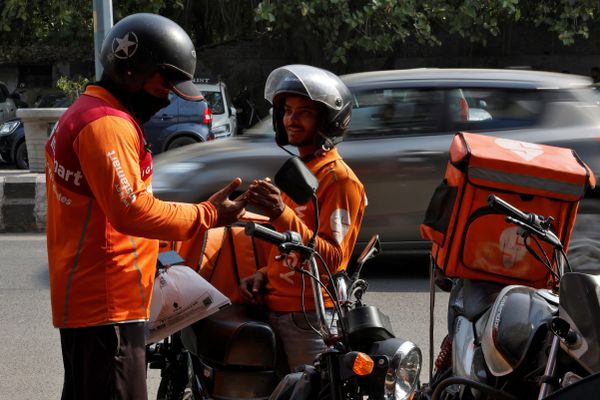MUMBAI, June 11 — In a middle-class suburb of Mumbai, workers at SoftBank-backed Swiggy's grocery warehouse race against time to deliver orders within 10 minutes. Their speed is tracked by the seconds on a screen that flashes red warnings for slowness.
Outside in sweltering heat, Swiggy's bikers, sporting the firm's trademark bright orange T-shirt, frantically collect packed grocery orders to deliver them nearby, while others return to tackle another shipment assigned on their app and waiting.
"Ideally, one needs to get done with the entire (pickup) process in one minute 30 seconds," warehouse manager Prateek Salunke said.
Swiggy warehouses are mushrooming across India to deliver everything from milk and bananas to condoms and roses within minutes — a business model that is reshaping how Indians shop.
It is also threatening millions of mom-and-pop stores that for decades dominated the grocery trade in a country where big supermarkets are relatively scarce and are located in more affluent neighbourhoods or malls.
Indians long relied on visits to small neighbourhood outlets for groceries or got free deliveries from them via phone orders, before the rise of e-commerce triggered by Amazon and Walmart's Flipkart over the past decade.
But the US giants, which offer location-dependent same-day or next-day delivery, are not as fast with groceries as Swiggy and its rivals Zepto and Zomato's Blinkit, which are ushering a quick commerce boom.
Goldman Sachs said in April quick deliveries account for US$5 billion (RM23.5 billion), or 45 per cent of India's US$11 billion (RM52 billion) online grocery market currently. As shoppers prioritise convenience and speed, quick commerce will account for 70 per cent of the online grocery market set to touch US$60 billion (RM282 billion) by 2030, it forecast.
IPO-bound Swiggy started as a restaurant food delivery business in 2014 and is valued at US$10 billion (RM47 billion), but it is now switching gears to bet more on the 'last-minute' grocery business in India, the world's third-largest retail market after China and the United States.
"We are training our guns to focus on a market much larger than food," a December 2023 confidential Swiggy strategy document seen by Reuters said of its Instamart service.
Its target? "21-35 year old, time-starved urban consumers who value convenience", the document said.
Swiggy did not respond to requests for comment on the document or its broader strategy.
The company doubled its warehouse count to 500 in 25 cities last year and has plans to increase it to 750 before April 2025, said an executive at one of Swiggy's financial investors, which also include Prosus, Qatar Investment Authority and Singapore's GIC.
Globally, Covid-19 lockdowns spurred fast-delivery startups, helping the likes of Turkey's Getir to expand, only to see the interest dissipate as shoppers returned to physical outlets after the pandemic. Luxembourg-based Jokr scaled back from the US market in 2022.
Sumat Chopra, a partner at consultancy Kearney, said quick commerce firms were benefiting from availability of cost-effective warehousing space and 'pampered' Indian consumers' long-time habit of ordering just a few items from neighbourhood stores by phone.
Swiggy will even take an order for a single mango, though it could cost about twice as much as walking to a nearby shop.
Many consumers are willing to pay up to save time.
Mumbai lawyer Natasha Kavalakkat, 27, who has a hectic daily schedule, uses quick delivery apps like Swiggy and Zepto to order apples and bread. She said getting juice packs delivered within minutes just before a party was a game-changer.
"This is too convenient."
The rise of quick commerce means many smaller retail stores are reeling under pressure.
Suburban Mumbai grocer Prem Patel's business had thrived in recent years, allowing him to refurbish his store and install air conditioning. He's not happy anymore.
"No one buys milk from malls and supermarkets. That was our uniqueness. But these apps have changed the game," said Patel, whose daily sales have halved to about 25,000 rupees (RM1,400).
Four retailer associations in four Indian states, representing 90,000 grocery shops of the country's estimated 13 million, told Reuters monthly sales were dropping by 10 per cent to 60 per cent for some due to the rise of quick commerce apps.
Swiggy's Instamart was launched as an "Indian version of 7-Eleven (on the cloud)", its internal document said, but "we are changing our positioning" to an "online supermarket".
— Reuters




